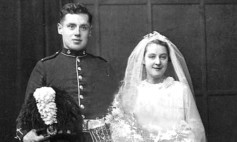When actor Alan Cumming delved into his family history, a dark secret about the death of his war hero grandfather emerged.
He discovered that psychologically damaged by his war experiences, maternal grandfather Thomas Darling died during a game of Russian roulette circumstances hushed up at the time.
The actor’s journey through the past was featured in the BBC television programme Who Do You Think You Are? and now a poignant reminder of Lieutenant Darling has gone up for sale.
An official letter of condolence and a medal belonging to the man is being sold by Aberdeen Medals for £1,250 which they say has been “unusually well researched” as a result of the television documentary.
The unfolding of the tragic and mysterious death of “Big Tam” Darling provided one of the most gripping stories featured on the programme, where celebrities learn more about their ancestors.
A “black hole” in Alan’s family history, the Perthshire-born actor embarked on a journey to discover the truth, starting by visiting his mother Mary in Monifieth to find out what she knew.
Tom Darling was Mary’s father and Alan found out he left home and joined the Cameron Highlanders when he was 17. Tom was stationed in Inverness, where he met and married Margaret before serving in France.
While in France he won a military medal for repeated deeds of heroism when as a despatch motorcycle rider.
Tom left the army in 1949 then joined the police force in Malaya and Alan learned his grandparents were recorded as “separated” at this time. Tom sent money home to the family but did not visit them again.
Within seven months of being in Malaya, 35-year-old Tom died in 1951. The official record of Tom’s death stated he died from a gunshot wound to her head which turned out to be during a game of Russian roulette.
Although the authorities knew the circumstances of the death they told his widow it had been a “terrible accident”, burying the truth for 60 years.
Mark Sellar of Aberdeen Medals said he would be delighted if the medal found its way back to the Cumming family and he had made efforts to contact Alan.
He surmised this example, awarded posthumously, might never have found its way to his surviving relatives and might have been sold off to a private collector.
